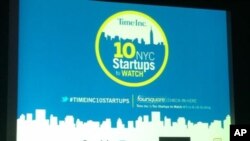The buzz was palpable at “Internet Week New York,” a digital culture festival. With more than 300,000 workers employed in New York’s technology sector, and nearly $2 billion in dot-com and online companies, Internet Week is one of the most closely watched events in the wired world.
Festival chairman David-Michel Davies is director of the International Academy of Digital Arts and Sciences, which co-presented the event along with the New York City Mayor’s office. He says new online platforms, such as smartphones, are sparking a second digital revolution for consumers, creating a potential bonanza for start-up entrepreneurs.
"Since we have these new platforms, they are just ripe for people to come in and make them even more useful. Like how can we make that mobile phone more useful? How can it improve people’s daily lives? Obviously we’ve been doing this on the Web for decades at this point, but there is still so much room and space that can still be explored.”
Foodspotting.com is one of Time Inc’s “Ten Startups to Watch” program. Online restaurant reviews have been around for years, Davies says. But Foodspotting allows people to upload reviews of particular dishes, along with photos of their meals.
“I love barbecue. So where can I get the best brisket? You can go into Foodspotting and actually search ‘brisket in New York City’ and you can actually see pictures of all the different brisket dishes at all the different barbeque places with ratings and so forth," says Davies.
Groups of friends who want to ensure that no one gets lost on the way to that special out-of-the-way restaurant can use GroupMe, another new online site that allows free group messaging to and from any mobile phone - almost like a private chatroom.
Those who simply want to relax at home watching TV, but are unsure what to watch might want to try SocialGuide.com. With Socialguide, viewers can use a mobile device to post comments about a show while they're watching it. Socialguide then ranks the show based on its social popularity.
Co-founder Sean Casey says the site offers information and the experience of online community, while also offering his partners and investors huge potential profits.
“The business side is that anytime anybody is talking about TV as TV airs, we are capturing that conversation," Casey says. "So that data is very, very important to a bunch of people. Networks are interested in that data. Advertisers are interested in that data. So our plan is to create a data product that we can sell back to networks and to advertisers so they can know what are the most socially engaging TV shows that people are liking and talking about.”
Other consumer-oriented startups include Yipit, which consolidates online bargains and makes them available in one searchable database, and I-Ella, an invite-only website that allows fashion lovers to put their wardrobes online and to buy, swap, sell or lend their clothes to other fashionistas. Buyers pay a 10 percent transaction fee which benefits their favorite charities.
What about a quick and easy way to pay the bills? Enter Manilla, a secure, free online service that consolidates all household accounts onto one page accessible through a single password. It also offers payment reminders. The arrangement appeals to businesses as well.
“Businesses today spend tons of money and tons of waste in paper and postage. The Internet has been around for 15 years, and on average only 15 percent of bills are actually paperless. And it’s costing businesses a fortune," says Jim Schinella, a Manilla co-founder. "So for a business we create this wonderful relationship.”
Just which dot-com ideas will produce the next Google, Facebook, eBay or Netflix is anyone’s guess. But it was clear from the excitement at Internet Week New York that the desire to digitally connect with others for fun or profit or both is as boundless as the Internet itself.





